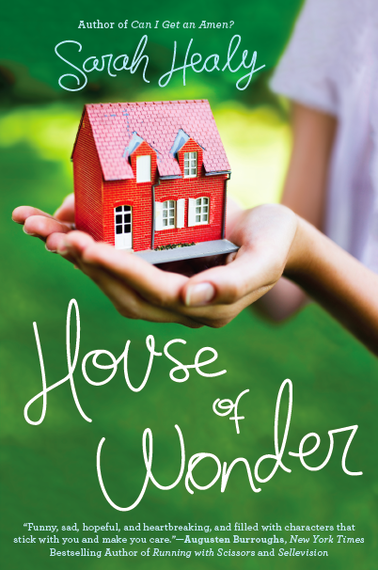On the heels of the release of Sarah Healy's second novel House of Wonder -- which was dubbed a "tender and emotional portrait of a modern family" -- I had the opportunity to chat with the supremely talented author and essayist about everything from her professional regimen to how she balances parenthood and career.
Healy's debut novel, Can I Get an Amen? published in 2012 and was a Target Emerging Authors pick in addition to a Penguin What the World is Reading program title. She lives with her husband and children in Vermont where she's currently hard at work on her third novel.
There are several characters in House of Wonder who seem to have some mental health issues or special needs, yet their conditions are never named. Why was it important to you to not pathologize them?
SH: In a way, I didn't feel like it was my job to diagnose my characters, but rather to simply tell their story. Readers then have the opportunity of getting to know them without any preconceptions or expectations, so it's their humanity that shines, rather than their conditions.
Jenna Parsons is the protagonist of House of Wonder, but the story touches on the lives of several generations of women in her family -- from her grandmother to her daughter. Why did you present such a span of relationships?
SH: I think I've always been interested in the way our childhoods play out in adulthood, particularly with how we raise our own kids. There is so much that we overcompensate for and so much that we unwittingly replicate. I wanted to show the thread of parentage, and how it's manifested from daughter to daughter to daughter.
But one of the most enduring and endearing characters in the book isn't a daughter but a son!
SH: That's true! Jenna's twin brother Warren is one of my very favorite characters. When the book begins, he is something of a neighborhood pariah -- a thirty-seven year-old man who still lives with his mother and delivers pizza for a living. But he is also this incredible, almost mystical force, who really acts as a master of ceremonies for the entire story. He has tremendous strength and wisdom, yet he is highly marginalized, even sometimes by his sister. I think the reader's understanding and appreciation of Warren follows the same trajectory as Jenna's.
Jenna's mother, Silla, is a former Miss Texas, yet she has little in common with the stereotypical shallow beauty queen. Tell us a little bit about what motivated her.
SH: Silla grew up in a time and a place where "pretty" was one of the most important things a woman could be. From her perspective, she didn't have any other options but to exploit what assets she had in order to distance herself from an upbringing that was marked by tragedy and cruelty. There's a scene in the book where Silla recalls how her measurements used to be announced to the audience during pageants. To her this is just a mundane fact, but Jenna is shocked. I think that exemplifies the world from which Silla came.
There is a legend in the publishing industry that the second book is always the hardest to write. Was that true for you?
SH: Yes!! I wrote this book once, then scrapped it and started all over again. I still remember looking at my screen and realizing that the novel wasn't want I wanted it to be, and that it would take more than a little "revising" to get it there. But I also knew that there was a story to tell and that I could do a better job at telling it. So I wrote the same book, with the same characters, twice. The only piece that remained intact was the first chapter. A few nervous breakdowns may have been involved.
In both my new novel, When We Fall, and in House of Wonder, the protagonists return to their suburban hometowns. Why did you choose the suburbs as a setting?
SH: Oh, I love writing about the 'burbs! They're a place where fitting in and maintaining the status quo is highly valued, and so it's wonderful to put characters there who go against the grain.
I know that I sometimes find it difficult to balance being a mom and an author. As a fellow mother of young sons, do you find it difficult to carve out time to write?
SH: I have a routine for my writing that involves heading upstairs after my kids have gone to bed and putting in as many hours as I can. I've been doing that for so long that I don't quite know what to do with myself when I take a night off. I end up puttering around, thinking that I really should be getting some work done. It's a little sad. One of these days, someone is going to need to give me an IV drip of Netflix.
I know you are working on your third novel right now. Can you tell us a bit about it?
SH: Oh, Emily! This is the hardest question for me because for some reason I'm totally incapable of communicating the ethos of the book until it's finished. But I would say the book I'm working on now is a sister story, of sorts. But it's also about the duality of human nature, and how much of who we are is within our control.

